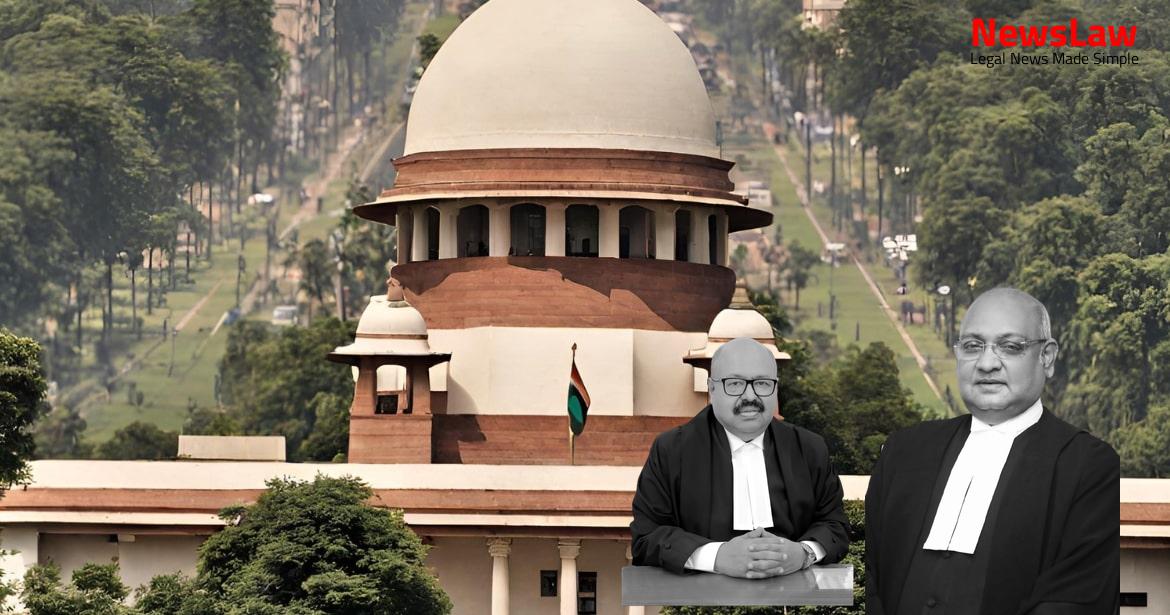Explore a recent legal case where the court delved deep into the nuances of the Karnataka Land Reforms Act to determine the validity of a Land Tribunal order. The emphasis was on analyzing the legislative provisions, application processes, and the responsibilities of both landlords and tenants under the Act. This case serves as a significant example of the judiciary’s commitment to interpreting laws accurately and advancing the purpose of land ownership legislation.
Facts
- Nadakerappa filed a suit before the City Civil Court seeking injunction for 1 acre 14 guntas of land.
- Land Tribunal granted occupancy rights to Nadakerappa for certain lands, which was later challenged and set aside.
- Legal representatives of Mariyappa challenged various orders before the High Court.
- Various writ petitions and appeals were filed by both parties challenging different orders and notices.
- High Court dismissed some appeals, while allowing others and quashing certain notices.
- Orders of Tahsildar, Assistant Commissioner, and Special Deputy Commissioner were set aside in favor of Nadakerappa.
- The Division Bench of the High Court set aside the order in a mechanical manner.
- The Division Bench remanded the matter to the Land Tribunal without justification.
- Division Bench allowed Writ Appeal No.1950/2007 and set aside the order passed in Writ Petition No.27230/2002.
Also Read: Analysis of Legitimate Expectation in Public Law
Issue
- Two questions for consideration in the appeals.
- First question: Whether Division Bench justified in reversing order of Learned Single Judge setting aside order of Land Tribunal and remanding matter.
- Second question: Whether Learned Single Judge justified in quashing notice dated 24.05.2002.
Also Read: Legal Analysis on Recovery of Excess Payments in Service
Arguments
- Appellant’s counsel argues there was a significant 20-year delay in challenging the Land Tribunal’s order.
- Nadakerappa, the predecessor-in-interest of the respondents, is accused of obtaining the Land Tribunal order through fraud.
- Defense claims Nadakerappa left the landlord’s name blank in Form No.7, later filling it as ‘Rama Krishnappa’, lacking proof of the tenant-landlord relationship.
- Respondents are criticized for not pursuing the case against Nadakerappa despite alleged fraudulence in obtaining the order.
- Learned Single Judge was not justified in quashing the notice on the grounds of delay.
- Learned senior counsel for the respondents sought to justify the order of the Single Judge.
- Amendment to Section 48-A of the Act added a proviso through Act No.31 of 1995.
- Nadakerappa filed a memo for correction of clerical error in the order.
- The Land Tribunal rightly issued a notice to the respondents based on this memo.
Also Read: Presumption of Marriage in Long-term Cohabitation Cases
Analysis
- The court emphasized the importance of considering the underprivileged and illiterate status of many tenants during the relevant period of the nineteen seventies.
- The legislation, Karnataka Land Reforms Act, 1961, aimed at granting ownership to tenants of agricultural lands.
- The Act introduced Section 45 for the registration of occupancy rights in favor of the tenant.
- The rules under the Act, especially Rule 19, outline the application process and the details required.
- The court highlighted the responsibility of the Tahsildar to verify application particulars with revenue records as part of the process.
- The concept of ‘protected tenant’ as defined in the Act was crucial in determining the rights of tenants under the legislation.
- The judgment highlighted the significance of advancing the purpose of the Act to grant ownership to cultivating tenants rather than obstructing it.
- The courts noted the need to decide cases on merit rather than remanding them without substantial justification.
- The case involved disputes over occupancy rights, correction of survey numbers, and the responsibilities of landlords and tenants under the Act.
- The Division Bench set aside the Order of the Land Tribunal dated 30.04.1982.
- As a result, the Writ Appeal became infructuous.
- The learned Single Judge was not justified in quashing the Notice.
Decision
- The order in Writ Appeal No. 1950 of 2007 dated 30.12.2014 is set aside
- The order of the learned Single Judge in W.P.No. 27230/2002 dated 25.07.2007 is restored
- The matter requires adjudication by the Land Tribunal on this question
Case Title: NADAKERAPPA SINCE DECEASED BY LRS. Vs. PILLAMMA SINCE DECEASED BY LRS. . (2022 INSC 374)
Case Number: C.A. No.-007657-007658 / 2017



